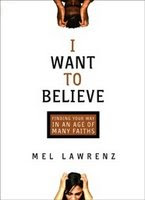Summary
For the last five chapters, Lawrenz has discussed and critiqued other religions. Now he turns his attention to the basic tenets of Christian faith and why he believes.
It is not enough simply to believe; the content of faith is critical. "There is no point in talking generically about 'being religious' or 'being spiritual.' Faith has content. Faith is not an alphabet soup-- it is a real language with real meaning" (170). Just as our physical needs warn us that something must be satisfied, so our need to believe reminds us that what or whom we believe in is just as important. Our need to believe also reveals the purpose for which we were created. The drive to believe will "carry us to places we would not go if we were just giraffes or alligators or eagles. Human beings are created to seek and to keep seeking until our last breath, when we cross over the line and discover so many things we could have discovered in this life if we hadn't wasted so much time" (171).
One of the most significant statement of faith is the Apostles' Creed, which is not an exhaustive statement of Christian theology, but a decisive core statement revealing the essential nature of Christian belief. And though it "needs to be translated across cultural lines and across time" (173), it has defined the essentials for the church throughout the world and across time. And while the statements of the creed are basic, brief, and to the point, they provide the foundation for rich and purposeful theological discussion that gives concrete expression to Christian faith.
Reflections
Once again, Lawrenz gives to us a bounty of quotables as he writes. He reminds us that the desire to believe is more than simply wishful thinking, and that belief in and of itself is not sufficient. The content of faith is critical as well. Like hunger, faith "is not just an ache, it is a warning: Better eat, or you'll die" (171).
Particularly helpful is Lawrenz' rather extended commentary on the Apostles' Creed. He demonstrates that, although the creed is quite brief and basic, the statements are nevertheless the product of the rich and deeply profound convictions of Scripture and the reflections of the early church. This chapter provides a nice primer on the creed itself.
With all the talk about God, however, Lawrenz' ends this chapter with a reminder that, first and foremost and ultimately, God is mystery. "[W]e should not be surprised when the character and reality of God turns out to be mysterious and beyond our normal rules of arithmetic and other empirical constraints" (187).
And yet, talking about God is necessary because we must believe.

No comments:
Post a Comment